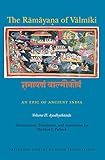The Rāmāyaṇa of Vālmīki: An Epic of Ancient India, Volume II : Ayodhyakāṇḍa / ed. by Robert P. Goldman, Sheldon I. Pollock.
Material type: TextSeries: Princeton Library of Asian Translations ; 149Publisher: Princeton, NJ : Princeton University Press, [2016]Copyright date: ©1986Description: 1 online resource (584 p.)Content type:
TextSeries: Princeton Library of Asian Translations ; 149Publisher: Princeton, NJ : Princeton University Press, [2016]Copyright date: ©1986Description: 1 online resource (584 p.)Content type: - 9780691173818
- 9781400883103
- 294.5/922 23/eng
- BL1139.242.A96
- online - DeGruyter
- Issued also in print.
| Item type | Current library | Call number | URL | Status | Notes | Barcode | |
|---|---|---|---|---|---|---|---|
 eBook
eBook
|
Biblioteca "Angelicum" Pont. Univ. S.Tommaso d'Aquino Nuvola online | online - DeGruyter (Browse shelf(Opens below)) | Online access | Not for loan (Accesso limitato) | Accesso per gli utenti autorizzati / Access for authorized users | (dgr)9781400883103 |
Frontmatter -- Contents -- List of Abbreviations -- Preface -- Guide to Sanskrit Pronunciation -- Part I. Introduction -- 1. Prelude to the Ayodhyākāṇḍa -- 2. Synopsis of the Ayodhyākāṇḍa -- 3. The Central Issues -- 4. A Problem of Narrative and Its Significance -- 5. The Philosophy -- 6. Aesthetic and Literary-Historical Considerations -- 7. The Characters -- 8. The Women of the Ayodhyākāṇḍa -- 9. Daśaratha -- 10. Rāma -- 11. The Text, Annotations, and Translation -- Part II. Ayodhyākāṇḍa -- Sarga 1 - Sarga 50 -- Sarga 51 - Sarga 111 -- Part III. Notes -- Sarga 1 - Sarga 50 -- Sarga 51 - Sarga 111 -- Glossary of Important Proper Nouns and Epithets -- Emendations and Corrections of the Critical Edition -- Bibliography of Works Consulted -- Index -- Backmatter
restricted access online access with authorization star
http://purl.org/coar/access_right/c_16ec
This is the second volume of a translation of India's most beloved and influential epic saga, the monumental Rāmāyaṇa of Vālmīki. Of the seven sections of this great Sanskrit masterpiece, the Ayodhyakāṇḍa is the most human, and it remains one of the best introductions to the social and political values of traditional India. This readable translation is accompanied by commentary that elucidates the various problems of the text-philological, aesthetic, and cultural. The annotations make extensive use of the numerous commentaries on the Rāmāyaṇa composed in medieval India. The substantial introduction supplies a historical context for the poem and a critical reading that explores its literary and ideological components.
Issued also in print.
Mode of access: Internet via World Wide Web.
In English.
Description based on online resource; title from PDF title page (publisher's Web site, viewed 30. Aug 2021)


